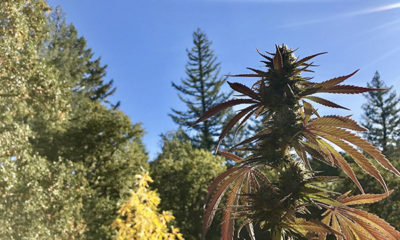
Joint Opinions
Mellow Moms: The Ottawa Prenatal Prospective Study
My baby rolls with everything. She is the queen of chill. She’ll giggle you through the produce aisle and right out the door of the grocery store. People are amazed at how responsive she is and how easily she handles everything. She sleeps in until 10 a.m. and has been doing so pretty much since the stork dropped her off. My 7-month-old daughter is the dimple of pure Zen and I often wonder if my wife’s cannabis use during her pregnancy is the reason.
As soon as the pregnancy stick said yes, we hit the bookstore for literature on cannabis and pregnancy. Little research existed, but the few studies that were done showed the risk was surprisingly benign and may actually have a positive impact on both the mother and child.
One study that showed mixed results on cannabis and its effect on child development was the Ottawa Prenatal Prospective Study. Starting in 1978, psychologist Peter Fried studied the children of cannabis users and the children of non-users throughout the course of their lives. Hundreds of tests were done on the same group of children to measure physical development, psychomotor ability, emotional and psychological adjustment, cognitive functioning, intellectual capacity and behavior.
Researchers found little difference between the children of cannabis consumers and those who abstained. Children of tokers scored higher on one set of cognitive tests at age one. Children of moderate cannabis users (one to five joints per week during pregnancy) had higher scores of psychomotor ability at age 3. At age 4, children of heavy smokers (19 joints per week) scored lower on one subscale of one cognitive test, but the difference was no longer present by ages 5 or 6.
Fried did point to issues of attentional behavior beginning at age 6. Children of heavy users scored lower on one test of vigilance. Parents also indicated their marijuana exposed children struggled with more conduct problems. However, all these issues disappeared after controlling for confounding variables such as alcohol, tobacco, other drug use or socioeconomic factors.
Although children of cannabis users and those non-exposed were remarkably similar, the researchers routinely focused on any negative findings. Fried maintained that his research underestimated the harms of prenatal cannabis exposure and that more sensitive measures were needed to highlight potential damage. He predicted that a new test of “executive function” would reveal these differences.
A short time later, he released preliminary analysis of his data that showed such effect existed. Almost immediately, the research became the poster child of the U.S. government to highlight cannabis’ harm. However, the results did not hold up to the test of further analysis. Prenatal drug exposure was found to account for 8 percent or less of the variance of children’s scores on developmental and cognitive tests, and this exposure included alcohol, tobacco and cannabis combined. No consistent relationship of harm to the fetus was found in either the timing or degree of cannabis exposure.
The flaw of Fried’s research was that it included not only cannabis exposure, but also tobacco, alcohol and other drugs. Melanie Dreher’s Jamaican study, on the other hand, focused solely on cannabis users and found that cannabis children tended to socialize more quickly.
“A lot of media publicity had been given to U.S. studies which purported to show that marijuana caused birth defects or serious developmental problems, but most of this research involved participants who were multi-drug users who had a terrible social support network that probably caused the problems,” Dreher said. “Instead, these problems were blamed on marijuana. Our testing showed that the children of women who used ganja had better alertness, stability and adjustment than children of women who didn’t use ganja.”
These studies illuminate the needless scare tactics surrounding mothers using pot during their pregnancy, showing that the world should definitely take a second look at how cannabis might not be that bad for babies after all.
How do you feel about moms and pot? What do you think about the results of the study? Tell us in the comments below.
























